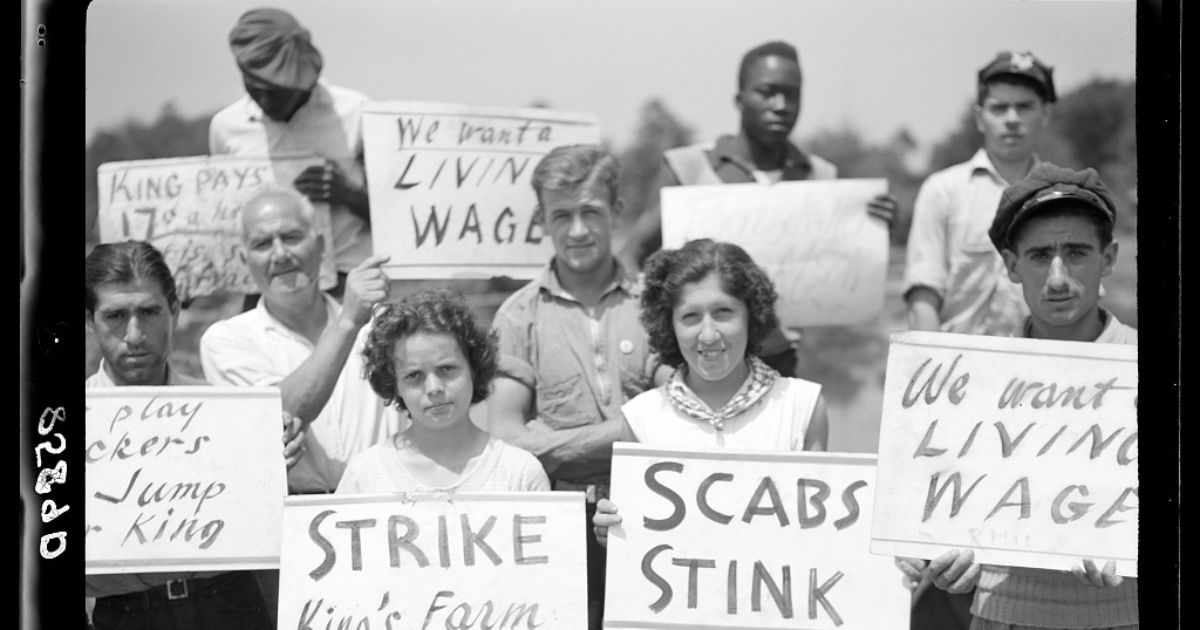Hot. Strike. Summer!!
It was just announced that hundreds of thousands of Teamsters driving for shipping and logistics company UPS will avert a strike after their negotiations came through, but even so, dozens of strike authorization votes are happening all across the U.S. as workers the world over watch WGA and SAG-AFTRA strikes, Amazon and Starbucks unionization drives, and smaller pickets like that at dinner theater Medieval Times. Union membership and public opinions toward unions are at highs not seen since the ’60s, and millennial and Gen-Z workers are joining unions, striking, and picketing at astronomical rates.
It’s important to remember that, although bluegrass in its modern iteration can often feel staunchly conservative, militantly patriotic, and delusionally nostalgic for “old-fashioned values,” it’s a genre that was born from the creativity of working class and impoverished Southerners, Appalachians, and immigrants – and it has always had a pro-worker, leftward bent. Singers, pickers, songwriters, and performers like Hazel Dickens, Ola Belle Reed, the Country Gentlemen, the Johnson Mountain Boys, Mac Wiseman, Earl Scruggs, and so many more were ardent supporters of the working class and hostile towards corporations, mines, and management. There are truly countless, never ending pro-worker, pro-labor songs to choose from in the bluegrass, old-time, and roots-music canon.
Bluegrass and old-time music, though entangled in a dense constellation of roots music and occupying space adjacent to folk music and the folk revival, were anti-corporate greed since before they had names, before Pete Seeger, before the folk revival itself. That legacy is important to place at the very center of bluegrass, a genre of music that was born out of industrialization (see also: Industrial Strength Bluegrass) as mountain folk, Appalachians, and Southerners migrated out of their rural homeplaces to urban industrial centers. Bluegrass was born from radio stations, railroads, from company towns and workers’ barracks. Whether rubber or auto plants in Ohio and Michigan, factories in Chicago, cotton mills and tobacco warehouses in North Carolina, or anywhere else in the region, as poor folks bled out of their ancestral homes to find work and upward mobility, they brought their music and their community mindsets. As bell hooks puts it in Belonging: A Culture of Place, the mountains and rural spaces are where mutual aid and anarchy are concrete, everyday practices, not just philosophies or concepts.
With those people and their music came a penchant for workers’ and labor rights, suspicion of management and company stores and towns, and a vehement, righteous anger at the injustices suffered by working class Southerners no matter where they migrated. It’s easy to find pro-Union songs, songs in support of workers’ health and agency, lyrics that espouse conservation and environmentalism in old-time, bluegrass, and string-band traditions. So easy, in fact, we quickly amassed a 4+ hour playlist featuring some of our favorite songs (bluegrass and beyond) for marching the picket line, raising a fist, and redistributing the power – and wealth – back to the world’s 99%.
Scroll to find the full playlist of Bluegrass & Roots Songs to Strike To. Below, enjoy a few selections from the list.
“In Tall Buildings” – John Hartford
John Hartford describes the doldrums of daily work as almost no one else can. (John Prine gets close with, “How the hell can a person/ Go to work in the mornin’/ And come home in the evenin’/ And have nothing to say?”) At the end of our 30-some years working, what will we have to show for ourselves besides a suit, haircut, and no more life left to give to our “retirement?” Plus, as any career musician can tell you, planning a life around retirement isn’t exactly a good option to begin with.
“Ain’t Gonna Work Tomorrow” – Wilma Lee Cooper
Ain’t gonna work tomorrow, cause it’s STRIKING day! Wilma Lee Cooper will, at long last, join the Bluegrass Music Hall of Fame this September. A bluegrass forebear who saw broad commercial success before the genre had a name or an understood identity, she regularly landed tracks with decidedly bluegrass aesthetics on Billboard‘s early country charts.
“Lazy John” – Bruce Molsky
Under capitalism, laziness is a radical act! Be like Lazy John! If you’re working all week in the noon-day sun just for 16 cents, yes, it’s strike time.
“Cotton Mill Man” – Jim & Jesse
As we remember the life and legacy of Jesse McReynolds, who recently passed, it’s striking that although he and his brother Jim performed largely cover songs and tracks written by others, they were still able to express with great subtlety their own points of view through the material they chose. Like “Cotton Mill Man” and Prine’s “Paradise,” which was a hit for the duo, their catalog of recorded and performed material is dense with class awareness.
“Black Waters” – Jean Ritchie
A truly timeless classic that remains as relevant today as in the time of its writing, as clean water protections across the U.S. have been repeatedly gutted since 2016 – and before. Our country continues to show where its priorities are, beating down protests and demonstrations even as popular and supported as Standing Rock, in order to force us to acquiesce and give up protection of our waters. The lyrical hook is even more poignant to someone, like myself, living in Tennessee Valley Authority territory in the Tennessee River Valley – where coal ash and pollutants are still regularly dumped into our waterways. These tales, these experiences, are best told directly from their sources, as in Ritchie singing this song.
“Carpal Tunnel” – Tristan Scroggins
One can find many a recording of “Carpal Tunnel” from across the years, but mandolinist Tristan Scroggins, in his mid-twenties, pointedly places this track in the present, delivering the lament in stark a capella accompanied only by body percussion. He deftly ties the lyric to embodiment and agency and reminds all of us – especially in an age governed by devices causing carpal tunnel writ large – we’re all merely one injury away from bankruptcy. Musicians know this fear intimately, as many a livelihood has been threatened by tendonitis and carpal tunnel.
“Tear Down the Fences” – Ola Belle Reed
A perfect encapsulation of solidarity across our differences – differences constructed by the ruling class to keep us quibbling amongst ourselves while they amass their wealth. This sort of community awareness often feels like a pure byproduct of the internet’s version of globalization, but even a woman banjo player from a tiny town in rural Western North Carolina understood that “all we have is each other,” way back before the worldwide web. It feels obvious to state. It shouldn’t seem remarkable, except that we’ve accepted the narrative that such compassion and ideas couldn’t possibly be born from rural spaces or the South.
“Blue Collar Blues” – Joe Mullins & the Radio Ramblers
From the shop steward of Industrial Strength Bluegrass himself, Joe Mullins, a classic working-man-blues-style bluegrass number about that paycheck to paycheck life. An all-too-common reality for so many pickers! Though that might be more accurately described as blueGRASS collar blues.
“Dark as a Dungeon” – The Country Gentlemen
Bluegrass mining songs are just as iconic in the bluegrass songbook as train songs, cheatin’ songs, murder ballads, and singing about moonshine. This version of “Dark as a Dungeon” by the Country Gentlemen is one of the best examples of the form – many of which made it onto our full playlist.
There are so many more bluegrass, old-time, string band, folk, and Americana songs for striking. Check out our full playlist below and let us know: What is your favorite pro-worker roots song?
Playlist selections by Justin Hiltner, Shelby Williamson, Jon Weisberger, and Amy Reitnouer Jacobs.
Photo Credit: By John Vachon in 1938. “Untitled photo, possibly related to picket line at the King Farm strike. Near Morrisville, Pennsylvania.” Courtesy of the Library of Congress.






